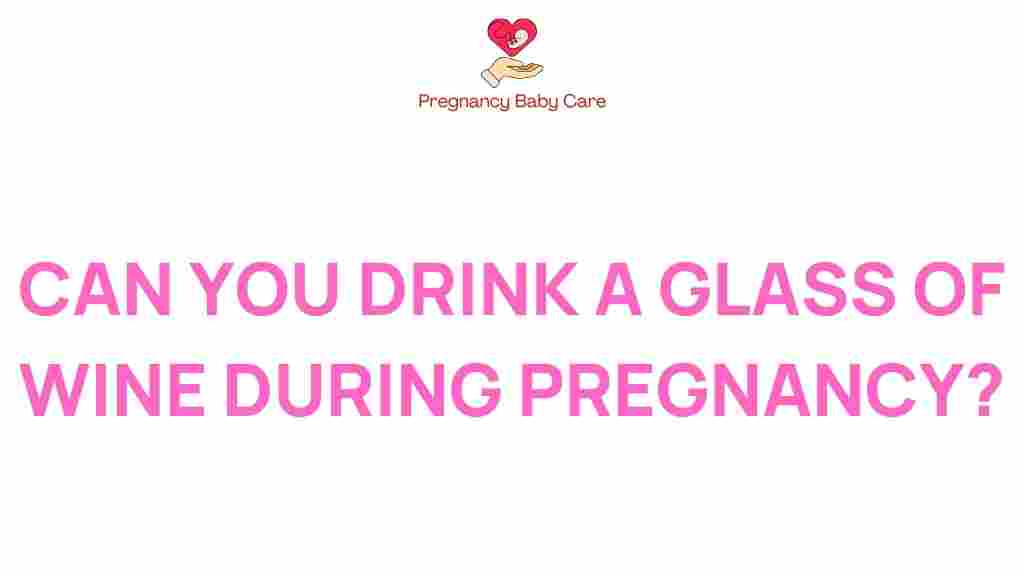The Wine Dilemma: Is it Safe to Sip During Pregnancy?
Pregnancy is a time filled with joy, anticipation, and a myriad of choices that can significantly impact both maternal and fetal health. One of the most pressing questions many expectant mothers face is whether it is safe to consume wine during pregnancy. This article explores the complexities surrounding alcohol and pregnancy, shedding light on the implications for fetal health, maternal choices, and the prevalent misconceptions about drinking during this critical period.
Understanding Alcohol and Pregnancy
Alcohol consumption during pregnancy has been a topic of debate and concern for years. Medical professionals often emphasize the potential risks associated with drinking alcohol, including wine, while pregnant. The primary concern is the effect of alcohol on fetal development, which can lead to various complications.
- Fetal Alcohol Spectrum Disorders (FASD): These disorders can result from alcohol exposure in the womb, leading to lifelong physical and developmental problems.
- Low Birth Weight: Babies born to mothers who consume alcohol during pregnancy are at a higher risk of being born underweight.
- Neurological Issues: Alcohol can interfere with the normal development of the brain and nervous system, leading to cognitive and behavioral challenges.
Maternal Choices and Safe Drinking Limits
When considering wine during pregnancy, it’s crucial for expectant mothers to understand what constitutes safe drinking limits. Current medical guidelines generally advise against any alcohol consumption during pregnancy.
Here are some recommended practices:
- Abstinence is Best: The safest choice during pregnancy is to abstain from alcohol entirely. This eliminates any risk associated with consumption.
- Consult Healthcare Providers: Regular discussions with healthcare providers about alcohol consumption can help clarify any doubts and ensure that maternal choices align with fetal health.
- Know Your Body: Each woman’s body processes alcohol differently. Factors like weight, genetics, and overall health can influence how alcohol affects both mother and baby.
Pregnancy Misconceptions About Wine
There are many misconceptions surrounding alcohol consumption during pregnancy, particularly regarding wine. Some common myths include:
- “A Little Wine Won’t Hurt:” This belief is prevalent but unfounded. No amount of alcohol has been proven safe during pregnancy.
- “Red Wine is Healthier:” Some claim red wine has health benefits due to antioxidants. However, these benefits do not extend to pregnant women.
- “Drinking in Moderation is Acceptable:” The term “moderation” can be misleading. The safest approach is complete abstinence.
The Importance of Prenatal Care
Regular prenatal care is essential for monitoring fetal health and ensuring a healthy pregnancy. During these appointments, healthcare providers can offer personalized advice regarding alcohol consumption and address any concerns regarding maternal choices.
Key components of prenatal care include:
- Regular Check-Ups: Consistent visits help track the progress of the pregnancy and the baby’s development.
- Screenings and Tests: Various screenings can identify any potential issues early on, allowing for timely interventions.
- Education: Healthcare providers can provide valuable information about pregnancy dos and don’ts, including the risks associated with alcohol.
Step-by-Step Process for Making Informed Choices
When faced with the dilemma of wine during pregnancy, it’s helpful to follow a structured approach to decision-making:
- Educate Yourself: Understand the effects of alcohol on fetal health and familiarize yourself with the latest research.
- Consult Professionals: Speak with healthcare providers about your concerns and any specific circumstances that might influence your choices.
- Evaluate Risks: Consider the potential risks of consuming wine versus the benefits of total abstinence.
- Make an Informed Decision: After gathering all relevant information, decide what is best for you and your baby.
- Communicate with Support Systems: Discuss your choices with your partner, family, and friends who can support you in your decision.
Troubleshooting Tips for Expectant Mothers
It’s common for expectant mothers to feel pressure or face situations where alcohol is present. Here are some tips for navigating these challenges:
- Plan Ahead: If you know you’ll be in a social situation, consider bringing a non-alcoholic beverage to enjoy.
- Use Distraction: If someone offers you a drink, politely decline and steer the conversation to another topic.
- Seek Support: Surround yourself with friends and family who respect your choices and can help divert any pressure to drink.
- Know Your Rights: It’s perfectly acceptable to say no to alcohol, regardless of social expectations.
The Bottom Line on Wine During Pregnancy
The question of whether it is safe to sip wine during pregnancy is complex. The overwhelming consensus among medical professionals is that the best choice for maternal and fetal health is to abstain from alcohol entirely. While some may argue for moderation or the occasional glass, the risks often outweigh any perceived benefits.
In conclusion, the choices expectant mothers make can significantly impact both their health and the health of their unborn child. Educating oneself about the risks of alcohol and pregnancy, consulting with healthcare providers, and making informed decisions are crucial steps in ensuring a healthy pregnancy. If you are looking for more information on pregnancy-related topics, feel free to visit this helpful resource.
Remember, every pregnancy is unique, and what works for one may not work for another. Staying informed, seeking support, and prioritizing prenatal care are essential for making the best choices for you and your baby.
For further reading on the effects of alcohol during pregnancy, you can explore more at this external link.
This article is in the category Pregnancy and created by PregnancyBabyCare Team
